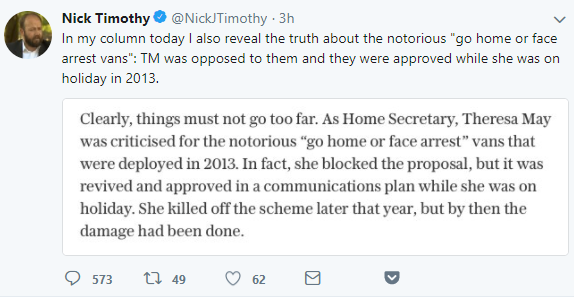
1. In your latest Telegraph column, you argue that “ministers are right to make Britain a harder country to live in for people who are here illegally”. Do you not think it would be appropriate to declare your interest – to whit, that you were one of the architects of the hostile environment policy which you are defending?
2. In the above sentence, is it fair to parse “ministers are right” as “I was right”?
3. Are there any matters on which you advised Theresa May on which you now believe yourself to have been wrong?
4. If so, do you have any plans to write columns about them?
5. In the same column, you argue that the scandalous treatment of the Windrush generation was “caused by two pieces of immigration legislation, more than 40 years apart” – the second of which, as noted, was in part your own work. What personal responsibility do you think you bear for the fact that, as you yourself acknowledge, some are now “finding themselves unable to work, rent a home” or even being “wrongfully deported”?
6. Do you think some kind of apology might be appropriate to those whose lives have been wrecked by your mistakes?
7. Why, in a tweet, did you refer to it as the “so-called hostile environment strategy” when the people who called it so were the government?
8. Do you believe there is any connection between Theresa May’s hardline stance on immigration, and the catastrophic loss of affluent ethnic minority voters that helped destroy the Tory party’s majority in last year’s election?
9. Do you believe there is any connection between that stance and the fact that the 2016 Citizens of Nowhere speech, of which you were the author, was widely interpreted as an attack on migrants – and not, as you’d later claim it was intended to be, an attack on the global rich?
10. Elsewhere in today’s column, you claim that Theresa May was actually opposed to the “Go Home” vans and that they were approved while she was on holiday. If this is the case, why has she never condemned them, or otherwise expressed her opposition to them?
11. And why did her senior advisors – such as, for example, yourself – not in her absence communicate this opposition to the department she led?
12. What do you imagine gave officials and junior ministers the erroneous impression that this is the sort of policy she would approve of?
13. Are you aware of the concept of “the ratio”?

14. According to a parliamentary answer given by Robert Goodwill in 2016, the vans were approved by then immigration minister Mark Harper, and “Theresa May was informed of the intention to pilot this campaign”. How do you reconcile this answer with your claim that she “blocked the proposal”?
15. Was Harper ever disciplined for approving a policy, widely perceived as racist, which his boss had previously blocked?
16. Do you think Theresa May subscribes to the convention of individual ministerial responsibility?
17. Is your contention that May was so weak that her department could implement policies she disapproved of in her absence?
18. Is “She was incompetent!” really that great an improvement on “Her policies were racist”?
19. Have you spoken to the prime minister recently, to check that she thinks you are helping?





